BAM – November 30, 1990
Addiction By Subtraction?
Are We Gonna Kick Tomorrow, Or Are We Gonna Be Hooked on Jane’s Addiction For The Duration?
By Roy Trakin
Pg 20-22, 24
“I’m gonna kick tomorrow.” – “Jane Says,” Jane’s Addiction
“We love being exploited.” – Jane’s Addiction’s Warner Bros. Bio
“You guys are gonna warp an entire generation.” – Lenny Waronker, president of Warner Bros.
Perry Farrell is onstage at LA’s Henry Fonda Theater on Halloween night, haranguing the hippie generation for selling out its ideals, and urging his followers to get out there “and take things over.” Then again, Farrell also told this crowd earlier not to let the threat of AIDS get in the way of their sexual freedom. And speaking of such freedom, this wiry, dreadlocked lead singer indeed oozes raw eroticism, as his band delivers a pounding post-psychadelic maelstrom. He’s a charismatic presence alright, but he’s also a little like that apocryphal guy your parents were afraid you’d follow if he told you to jump off a bridge. His cultural pronouncements are not only dubious, they’re downright paradoxical. How else do you explain Farrell and Jane’s Addiction encoring with a letter-perfect version of that hippie anthem, “Ripple” by the Grateful Dead?
To call Jane’s Addiction a great rock ‘n’ roll band at the dawn of the ‘90s is to damn them with faint praise. Like Howlin’ Wolf, Elvis Presley, the Rolling Stones, the Velvet Underground, the Doors, the Sex Pistols, Suicide, the Ramones, and the Shaggs before them, Jane’s Addiction polarizes its audience. You either love ‘em or hate ‘em, and a lot depends on whether you’re over or under 30. Jane’s Addiction’s problem is making music for a g-g-g-eneration whose consensus music of choice is no longer rock ‘n’ roll. They’re fighting the good fight in a battle that’s long been lost to the likes of the rappers and dance divas. Jane’s Addiction’s members are adolescent rebels and countercultural heroes to a class of baby busters and yuppy wannabes whose reference is MTV, not Woodstock; Paula Abdul, not the Beatles; and Jimmy Carter, not J.F.K.
Many people in the thirty-something crowd currently believe that traditional guitar-bass-drums rock ‘n’ roll has lost its ability to shock, goad, offend, and get in your face. They also believe that it no longer has the power to change society, since it’s been co-opted, sanitized, and steamrolled into submission by the multi-national conglomerates that distribute 90 percent of the records you’re able to buy in retail outlets across the country and around the world.
“You know we got signed to Warner Bros. Do you want to hear about the bidding wars? We had ‘em all kissing our feet. Getting a record label to put out the bucks is the best insurance a band has.” – Jane’s Addiction bio
Jane’s Addiction refuses to be co-opted. In a time of repression and censorship, Farrell put a naked sculpture depicting a ménage à trios on the cover of his band’s latest album, Ritual de lo Habitual. And when retails stores balked at carrying the album, he created an alternative sleeve that’s completely blank except for a reprint of the First Amendment. While the world at large seems to be caught up in “Just Say No” anti-drug paranoia, Farrell has the temerity and audacity to admit to using heroin and (gulp!) even enjoying it. Finally – and perhaps most importantly – at a time when the music industry seems to be built around cookie-cutter rip-offs and commercial calculation, his new record harkens back to the creative rush and experimentation of the ‘60s, daring to touch on a presumed shared culture based on the music and those attitudes. There are some people at Warner Bros. who think Jane’s Addiction could be the next big thing – LA’s hard-rock successors to Guns N’ Roses. Of course, many more predict that the band’s headed down the path of self-destruction. Either way, Perry Farrell’s not compromising, even if his father, a jeweler on 47th Street in New York City, phones him and wonders; “Why can’t you sing more like that schvartze… what’s his name? Richie, y’know… Lionel Richie? (Perry goes on to explain that his father does like the Middle Eastern raga feel the band achieves on “Of Course” from the new album. “He says it sounds like Fiddler on the Roof,” snorts Farrell, sarcastically.)
There are a lot of people who think Perry Farrell’s a schmuck, but I’m not of of ‘em. I kinda like that this Venice street denizen is really a middle-class Jewish kid who grew up rooting for the Mets in his hometown of Flushing, Queens. Like a great many other rock ‘n’ rollers, he’s not afraid to make a fool of himself, nor des he step back from making often harsh self-judgments. You can take him or leave him – but, either way, its all going to be on Perry Farrell’s terms.
“I don’t necessarily want to be popular,” he protests to me. We’re on our way to scout locations at nearby Mt. Baldy, about forty-give minutes outside of LA, for a free concert the group plans to shoot for a video. “I did [want to be popular] when I wasn’t, but now that I’ve had a taste of it, I realize it’s not that exciting. Public opinion is usually the most ignorant opinion you can gather. It’s like the architecture of a 7-Eleven. When you have to duplicate it too many times, it starts to suck. When you mass-produce pancakes, sooner or later, twigs will start to show up in them.
“Mass communication tends to reduce things to their lowest level. You’re forced to boil things down so everyone understands. I know for a fact not everybody likes me, but to me, that’s healthy.”
So Perry and his band – twisted, psycho-blues guitar-slinger Dave Navarro; sturdy bassist (and original member) Eric Avery; and drumming anchor Stephen Perkins – have stubbornly done things their way, from making numerous managerial changes to insisting that Warners finance a trip to Catamaco, a small Mexican town where Farrell and his longtime girlfriend Casey were married in a blood-mingling Santaria ceremony, which was captured on film for posterity. The ceremony is actually a Central American variant of Haitian voodoo, which arose when African slaves were forced to adopt Christian iconography as a survival mechanism, even though they were still secretly praying to their pagan gods. It’s a phenomenon Paul Simon has also mentioned in connection with his new album. But Perry was there first, and he has used a lot of Santerian imagery throughout the new LP in both its artwork and musical themes.
“I guess I was just drawn to the colors and the sly joke of it all,” he explains. “I also responded to the pageantry. There’s something very basic about it. I wanted to concentrate on things of value, the necessities of life, the things that make you cry in a film. These people used Christian symbols to goof on their captors because they didn’t want to get flagellated. They posed as Christians without giving up their true beliefs.”
While the philosophy behind Ritual de lo Habitual may be a mite exotic, the ideas behind the songs themselves are thoroughly down to earth. “Stop” is a metallic plea to “turn off that smokestack and that goddamn radio” – a rather conventional, ecological cry in the industrial wasteland, but absolutely mesmerizing in its effrontery. “No One’s Leaving: is a true-life take of Perry’s sister and her black boyfriend who were forced to sleep in the park by a disapproving family. “Been Caught Stealing” is a no-apologies ode to just that, while “Of Course” takes a snake-charming Middle East riff and plugs it into a tale of how Perry’s older brother used to pin back his arms and make him slap himself in the face. The incident is a harrowing, if accurate, metaphor for drug addiction. “Classic Girl” is a balladic, moody love song that proudly reclaims cultural revolution for a new generation disappointed they missed out on the halcyon era of peace and love. (“They may say, ‘Those were the days…’ / But in a way, you know for us, these are the days.”)
All in all, Ritual de lo Habitual is the most messed-up-and-proud-of-it album dealing with druggies to hit music consumers since Exile on Main Street and Tonight’s the Night hit the racks during the ‘70s. This hardly comes as a surprise, since rumors were rampant that the recording of the LP was delayed while at least one, maybe more, members of the band were laid up in drug clinics. The rumors came complete with accusations by the band’s former manager, Gary Kurfirst, that they were drug addicts. And while Perry did nothing more than smoke a little pot in my presence, it has been reported that he once shot up in front of a Melody Maker reporter and photographer. In several interviews, he has extolled the glories of smack, and while it may be somewhat admirable against the backdrop of raging government hypocrisy, one wonders if his young audience is grasping Perry’s somewhat ironic grandstanding. Most people think he’s just guilty of glamorizing the act of getting high.
“I’m simply writing the way Bob Dylan did when he said he married Isis, man,” Farrell says coyly. “I’m just dreaming it all up. I mean, did Dylan really go riding in on a horse on the twelfth day of May in the drizzle and the rain?”
So then, Perry, what is your experience with heroin?
“That it’s great,” he says, as his girlfriend Casey winces and pokes him in the ribs. “I don’t think it’s anybody’s business if I choose to sit there and bang myself on the head with a board…”
Yeah… or slap yourself in the face…
“Maybe I’m just too damn smart for my own good, or I’m doing it for a reason,” he says. “Maybe I need to chill out a little bit. If you don’t get anything extra for being healthy, why should you be penalized for being a little sick?”
He had me there. But isn’t it dangerous.. life-threatening, even?
“So’s driving,” he says, blithely. “Trouble comes no matter what you do. People get killed every day for no reason at all.”
But isn’t this all just a rationalization…
“For doing what I want to do? Of course. What else is there? You can commit a crime, and you either get away with it or not,” he explains, very animatedly. “You take your chances. There are certain sacrifices you make when you’re a heroin addict. Like having any kind of life.”
Far from romanticizing the drug, Farrell realizes only too well exactly what the consequences of heroin are – and he’s still willing to face them. But what about the impressionable young fan who sees him doing smack, thinks it’s “cool,” and tries it himself?
“If anybody thinks they want to live like me, they’re completely moronic,” he laughs. “I don’t like people copying what I do. I didn’t get into this to make sermons or set up structures for others to live by. My intent has nothing to do with teaching. It’s to amuse myself on this completely boring planet. Listen, I’m very happy. Every day is different for me. At least I’m not in some box somewhere eight hours a day.”
“Compare Jane’s Addiction to a life insurance agency. There’s really quite a difference, isn’t there?” – Jane’s Addiction bio
Personal freedom an non-conformity are obviously very near and dear to Perry Farrell’s heart. They dominate the themes of Jane’s Addiction’s three albums, the last two records for Warner Bros. Some say his desire to be different often lapses into arty self-consciousness, a charge Farrell denies. As far as this writer is concerned, heavy metal could use all the arty self-consciousness it can get at this point. The idiom’s become a parody of itself, so why shouldn’t it be celebrated in the utter self-parody of Jane’s Addiction?
“Isn’t music an art form, too?” Farrell is asking a rhetorical question. “Art has gotten so far away from popular music that people actually have to create its own category for it. Of course we’re an art band.”
In fact, Farrell would prefer to devote even more time to his sculptures, films, and related fine arts projects. Following this record and the band’s current tour, he insists he wants to get out of LA and far away from the music business.
“This will be the last Jane’s Addiction tour for a while,” he announces. “And I’m not even sure I’ll come back to the [Jane’s Addiction] name. It’s nice, but it’s just a shell.”
So you won’t see Perry Farrell playing slide guitar on a folding chair when he’s 60 years old?
“I enjoy performing while I’m doing it,” he explains. “It’s as exciting as surfing to me. But my mind wanders. I like to do other things, too. I’m sorry if I’m no one of the boys in that respect, but I can’t help myself.”
He’s seen the future of rock ‘n’ roll, then, and he wants no part of it…
“Not if it’s anything like the past,” he nods. “I’d like to continue recording music. I don’t care if it’s for a small label in Chile, if Warner Bros. decides not to put it out. I’ve had my taste of fame and success. It’s exciting, but I’d rather learn a useful art form, like tattooing, and just go away…”
Farrell is expressing what many of us who grew up on rock ‘n’ roll feel these days – that the form has lost its power as an artistically innovative, culturally bold, and progressive form of music and culture. As great as Jane’s Addiction may be, the band is performing in the middle of a vacuum of kids who won’t get fooled again. Or will they? Après Jane’s Addiction comes le deluge of Milli Vanillis. Right Perry?
“For me, it’s over, but I wouldn’t want to be short-minded enough to think it can never be that way again,” says the 32-year-old singer. “In fact, I’ve seen a little glimmer here in LA of something starting to rise. I don’t even want to say what it is yet, because if it turns out to be s—, [I] don’t want to be caught advocating it. Anyway, all you can do is use God’s garbage. It’s all there. The only think you can do is rearrange the furniture.”
“We have more influence over your children than you do, but we love your children.” – Liner notes from Ritual de lo Habitual
In a perfect world, there would be no need for Jane’s Addiction. If a society is judged by the music it listens to, Jane’s Addiction signals a world teetering on the brink of psychic and physical destruction. The headbanging strum und drang of the band live is apocalyptic: the cries of the innocent and no-so-innocent being led to a slaughter of their own choosing. The Jack Thompsons and Tipper Gores of the world should fear this music, because it seeks to destroy everything they stand for. Or does it? On the other side of Farrell’s raging id is a stern, moral superego whose only fear is his own fleshly weakness, sort of a strange contradiction for someone who flaunts his sexuality so openly.
Farrell just shrugs when he considers the forces of censorship that have battled this band, forcing them to issue two different album covers for Ritual. “Artists are the true leaders of this planet,” he proclaims. “People should realize that politicians are nothing more than secretaries. Let’s face it. George Bush can not turn on a crowd like I can, but he’s better at handling the books than I am. SO why can’t we both live on this planet in peace?”
Why, indeed. In fact, Perry Farrell seems to be getting his act together quite nicely these days, than you very much. He’s in good health, and the band came back from its recent European jaunt as tight and committed as its [sic] ever been.
“People need this music, like they need their best drug, like they need their mother, like they need their girlfriend’s pussy,” he cackles. “I have my goals, and they’re all completely selfish. They all have to do with me being able to do things in life I want to do, such as being able to see this whole globe and how people live on it. Americans are fine, but they’re in just one spot. If you travel a great deal, you get to see that people’s realities are completely different. It’s all what they talk themselves into. You get to see what’s real and what’s mass hypnosis.”
Farrell says he doesn’t judge anybody else, so he’d prefer if you didn’t judge him.
“There’ll always be guilt,” he says. “It’ll be around a long time, so don’t worry about it.”
One might think this is certainly an artist who’s on the road to willful self-destruction. On the other hand, he has chosen it of his own free will and with both eyes wide open. It’s a strict code of ethics that also applies to his work.
“To me, there’s an honor in where and how you appear,” he tells me. “And I want a certain degree of control over that. I don’t want to just get thrown out there. You can get so big that you’re not the focal point of the painting anymore. You’re the wash in the background. Listen, I get to do my projects and I get to eat. I can always call someone up at the record company and say, ‘Hey, I wanna have a talk. It just has to be at a Thai restaurant.’ At least I’ve never had to compromise my art.”
“Got a little game and I take it to the park / I don’t care who plays as long as the game is on.” – “No One’s Leaving,” Jane’s Addiction
Jane’s Addiction is probably the last rock ‘n’ roll band I’ll ever feel passionate about. I thought it was touching the way Farrell asked his Halloween audience, “Isn’t it great that the best band in the world comes from your hometown?” as if that still meant something. It showed Perry Farrell isn’t a complete nihilist, and reminded me of that old saying: “Scratch a cynic and you’ll find a romantic.”
You can’t help but like Perry Farrell, but you gotta wonder if he’ll survive long enough to appreciate the adulation that’s sure to come his way ten years from now, when 21st century teenagers look back at Jane’s Addiction and realized they ushered in rock ‘n’ roll’s fin de siecle [sic]. Or is it the harbinger of another Golden Age of socially committed, spiritually ascendant, mind-expanding pop? Are we gonna kick tomorrow, or are we addicted to Jane for the duration? Will my kids understand why I love this stuff, or will they be grooving to their own world beat hip-hop hybrid? Hey, who knows?
“I hope I die before I get to the point where I can’t change,” offers Perry, paraphrasing and updating that hoary rallying cry for a post-baby-boom-goes-bust generation. “I truly believe you can get smarter.”
I sure hope he’s right.
- BAM – November 30, 1990 – Cover
- BAM – November 30, 1990 – Page 1
- BAM – November 30, 1990 – Page 2
- BAM – November 30, 1990 – Page 3
- BAM – November 30, 1990 – Page 4

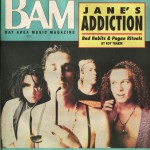
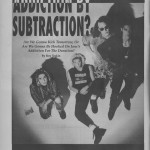
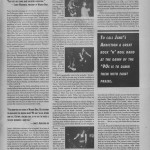
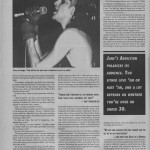
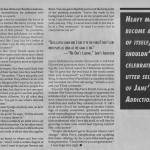
You must be logged in to post a comment.